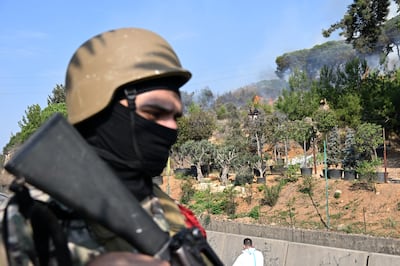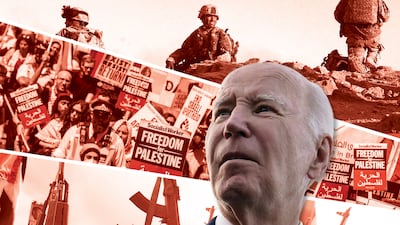America remains understandably fixated on the outcome of an historic election where the spotlight has been on issues closer to home such as the economy, abortion, immigration and the country’s democratic system itself. Foreign policy issues have mostly been on the sidelines, with some discussion about whether the Middle East wars or foreign interference in America’s elections might affect outcomes in certain swing states.
No matter who wins the race for the White House, US President Joe Biden’s successor will have his or her hands full with a long list of challenges and unresolved conflicts in the Middle East – as well as a handful of limited opportunities. In his final months in office, how can Mr Biden take the sad song that has been his Middle East policy and make it better for who comes after him, whether it’s former president Donald Trump or current Vice President Kamala Harris?
The Biden administration’s Middle East approach during the past year has mostly been one of strategic drift – allowing actors such as Israel, Iran, Hamas, Hezbollah and the Houthis to drive the dynamics. More than a year into an Israel-Hamas war that has expanded to several fronts, the Biden administration has been unable to achieve nearly any its stated diplomatic and security outcomes.
That is mostly due to the complexities of the region and the fact that the main combatants see their fight as existential. But it is also related to the Biden administration’s unwillingness and inability to create a proactive strategy that engages the region with some of its closest partners across the Middle East.
The Biden administration did not arrive at this moment by accident. It took office with many other priorities than the Middle East – it was strongly focused on national recovery at home amid the Covid-19 pandemic, and its foreign policy priorities centred on competing with China, dealing with climate change and rebuilding ties with Europe and Asia.
In 2022, Russia’s invasion of Ukraine led to a surge in global oil prices at a time when inflation was a growing challenge in America, and Mr Biden visited Israel and Saudi Arabia to strengthen ties. After China brokered a deal between Iran and Saudi Arabia to restore ties in March last year, the Biden administration intensified its efforts to strengthen bilateral links with Saudi Arabia and worked to broker a Saudi-Israeli normalisation deal.
But the October 7 attacks and their aftermath put the Biden administration in tactical, reactive crisis-management mode. It was unwilling and unable to exercise leverage and use the full range of its powers to achieve most of the goals it sought, including a long-term ceasefire and hostage-release deal, sufficient humanitarian aid for Palestinians in Gaza, and protections for civilians. The best things that could be said about the Biden administration’s approach over the past year is that it has worked to prevent a full-blown conventional war across the Middle East, and it got the release of some hostages in a temporary ceasefire at the end of last November.
How can the Biden administration best use the time it has left in office? It could take important steps to improve its policies in the Middle East, but it needs to be realistic about what can be done. It can still shape the conditions in the region and the mechanisms for co-operation with close partners to make modest steps towards two big-picture goals – the creation of a state of Palestine as part of a two-state solution and a sustainable reduction of tensions with Iran and its network across the region. Neither of these two big-picture items will be achieved during the remainder of Mr Biden’s term, but it can take three steps that will help his successor move towards these strategic outcomes.
First, it must step up America’s role as a regional security integrator among its partners to benefit a wider circle of ordinary people across the region. One important function the US has played in the past year is limiting and containing a bigger conflict that otherwise might have erupted between Iran and Israel – this was seen in the exchange of direct attacks earlier this month as well as April. No other outside actor has the firepower, direct military presence and broad networks of relationships to play the role America does on security. America should continue to nudge its partners to increase interoperability and co-ordination on things like regional missile and drone defence, as well as co-ordinated maritime operations that encourage partners to work together.
Most importantly, the Biden team could do more in co-ordination with Middle East partners to enhance civilian protections for Palestinians, Lebanese, Yemenis, Iraqis and Syrians.
Second, the US must build a formal regional diplomatic coalition with partners to advance the two-state solution. The Israel-Hamas and Israel-Hezbollah wars are arguably the greatest strategic threat to regional stability since the rise of ISIS. The Biden administration should take a page from the Obama administration’s efforts to defeat the terrorists; it should form a regional and international coalition to work in lockstep towards the goals of building a pathway to a two-state solution, something that will probably not happen early in the next administration, but nonetheless remains a strategic priority.

This coalition could work together on the diplomatic and political steps to help Palestinians create a new framework for governance in post-war Gaza, and it can start to develop a “marshalling” plan to organise the expertise, knowledge and financial resources that will be needed to create a pathway to a functioning state of Palestine. This coalition could also work together to isolate the spoilers in the region who remain fundamentally opposed to a two-state solution.
Third, it must isolate extremists in Israel, Iran and across the region who oppose peace and stability. Regarding Iran and its so-called Axis of Resistance, this means complementing US military efforts against militias and terrorist groups who threaten America and its allies. However, it also means creating a new diplomatic and political co-ordination effort to boost those countries and figures who oppose Tehran’s efforts to destabilise the region and support a two-state solution. A key component of this is sanctioning and isolating Israeli extremists who threaten Palestinians while trying to undermine a two-state solution.
The question of who will be best positioned to pick up the baton from Mr Biden on Middle East issues is a complicated one that is open to significant debate and conjecture. If Mr Biden takes these three steps and improves the conditions in the region slightly, both Ms Harris and Mr Trump stand a better chance of moving towards a more proactive agenda on issues like advancing a Saudi-Israeli normalisation accord and fostering regional integration. But without attending to both Palestine and Iran properly, neither Ms Harris nor Mr Trump stand much of a chance of performing any better than Mr Biden did.
Mr Trump and Ms Harris have staked out different positions on the key Middle East issues, but it remains unclear how much either of them will prioritise the region. Given the high degree of uncertainty in America’s election and in the Middle East as well, the most that could be said credibly about the main contrast between Mr Trump and Ms Harris on the Middle East is this: strategic unpredictability compared with a technocratic tactical approach.
Mr Trump will be less predictable than Ms Harris – and he will zig-zag on particular Middle East policy questions the same way he did during his previous term. He will call for quick ends to the wars, while also giving Israel a blank cheque to do what it sees fit. On issues like Iran, Mr Trump is so difficult to pin down that he is as equally likely to try to broker a quick deal with Tehran as he is to back efforts by Israel to double down on its military approach. It is anyone’s guess what he might do in the Middle East – and Mr Trump may even surprise himself given his lack of consistency.
Ms Harris, by contrast, is mostly cut from the same cloth as her boss, Mr Biden. Though she has voiced greater empathy for the Palestinians, the tone shift has not, and will probably not, result in a major policy shift, unless Mr Biden takes some of the steps suggested above. On Iran, Ms Harris is likely to pay more lip service and even dedicate more time and effort on diplomacy, but the realities of Tehran’s negative role on regional and global security are increasingly difficult to ignore.
America is on the edge of an unpredictable period in its own politics – and this comes at a time of major strategic uncertainty in the Middle East and the broader world. The best pathway for America to shape and influence outcomes in the Middle East is working more closely with reliable partners towards two main goals that have been articulated by several US administrations from both political parties for years: a two-state solution to the Palestinian-Israeli conflict and an Iran that no longer threatens its neighbours with endless wars.


